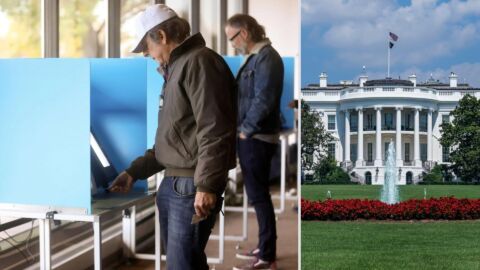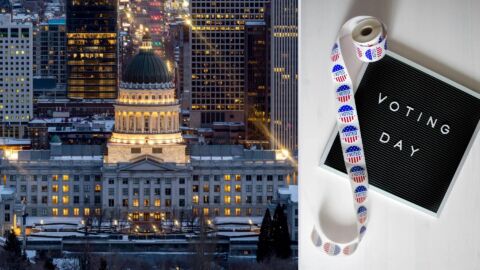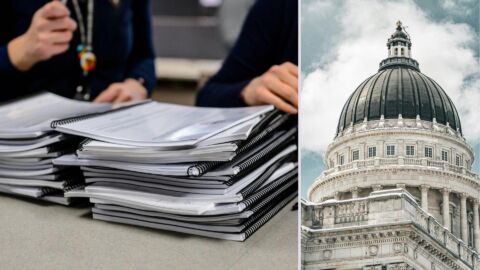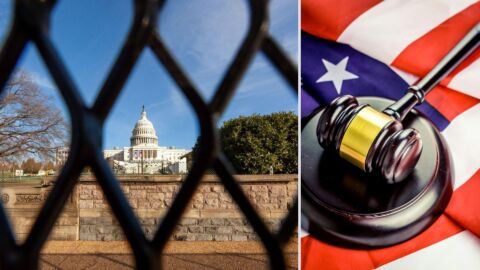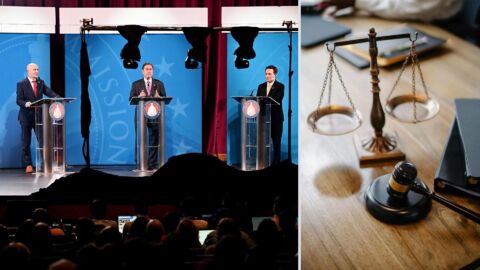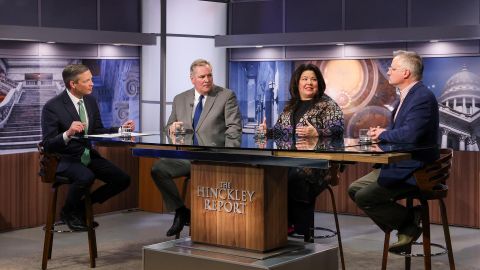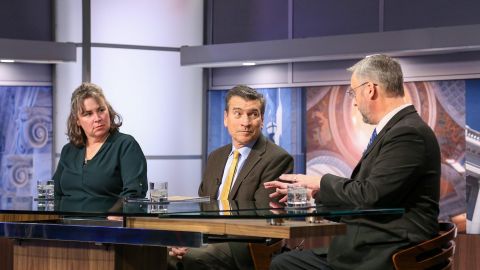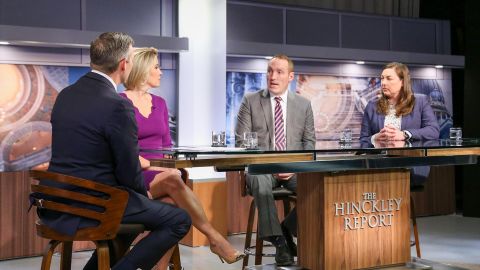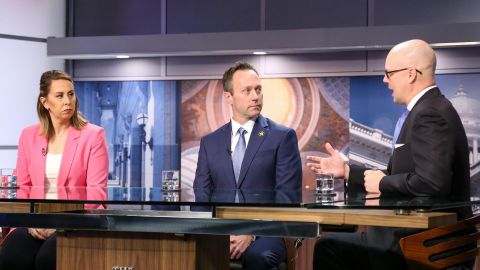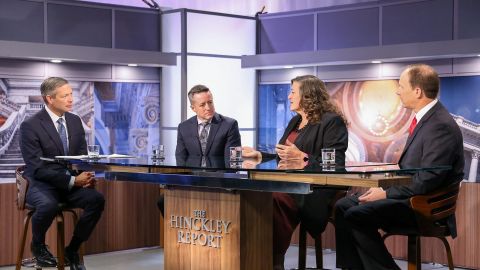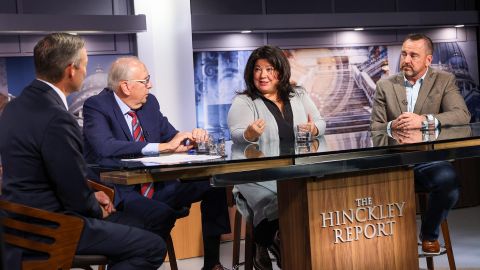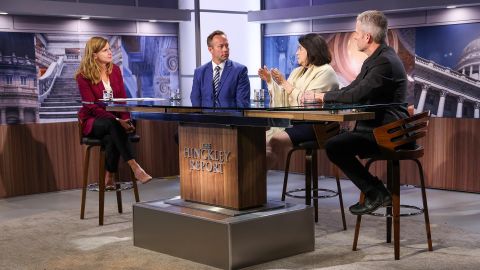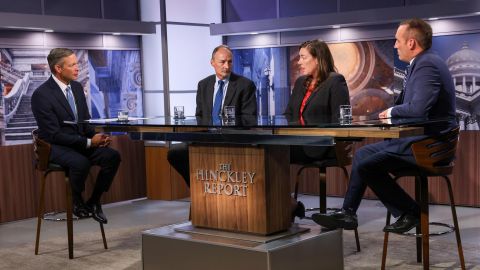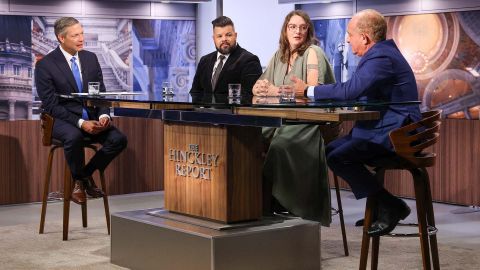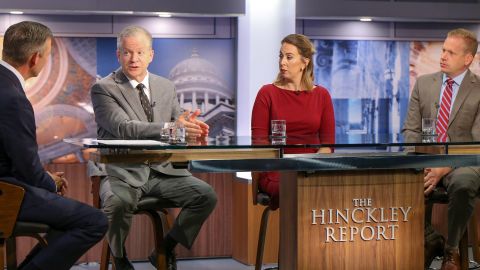announcer: Funding for "The Hinckley Report" is provided in part by The Cleone Peterson Eccles Foundation Fund, Merit Medical, and by contributions to PBS Utah from viewers like you.
Thank you.
Jason Perry: Tonight on "The Hinckley Report."
Our panel recaps a summer filled with heated races and consequential political battles.
Historic surprises and new developments create implications for the November election.
And local leaders push to amend the state constitution.
♪♪♪♪♪ Jason Perry: Good evening and welcome to the ninth season of "The Hinckley Report."
I'm Jason Perry, director of the Hinckley Institute of Politics.
Covering the week, we have Lindsay Aerts, reporter for KSL 5 TV; Max Roth, anchor for Fox 13 News; and Glen Mills, director of government relations for the Utah Department of Corrections.
We're so glad to have you all in on the season premiere of "The Heckler Report."
Lindsay Aerts: What a summer.
Jason Perry: Wow, I can't even believe all that has happened.
Well, you're gonna break it down today.
We're gonna--a little bit about what's happened, a little bit what's happening now, and what we're gonna see going forward.
I think we'll start today with a sort of a recap of some of these, the primaries, that occurred in the state of Utah because what happened there is going to reflect what comes here through No--all the way through November.
I wanna start with the second congressional district with you, Lindsay.
Celeste Maloy ended up winning that primary by 176 votes.
So close.
That's after a recount.
A lot happened in this race.
Kind of give us some of the key themes that you saw in this race?
Lindsay Aerts: Yeah, well, I think the closeness of the race is one of the key themes, right?
You saw Senator Mike Lee endorse her challenger, Colby Jenkins, in the convention portion of the primary race, right?
And that really boosted him at Convention.
And he really did it in this kind of like two days before the convention kind of way, really trying to, almost knock her off.
She didn't gather signatures, right?
So she had to win at Convention, which she didn't, but she won enough that she made it to a primary ballot, right?
And so you saw that endorsement really kind of boost him in that way.
I don't know if it's so much translated to the primary, but just the closeness of this race was so interesting to me.
It really goes to show that--I know we say this all the time, and it sounds taboo, but every vote counts, right?
I mean, we had to recount this, there were lawsuits challenging some of the ballots that got postmarked in Vegas, right?
And so, I think the crux of this race came down to Washington County, right?
Celeste Maloy won most of the counties.
Colby Jenkins won by a lot, Washington County.
And so that's a juxtaposition to what Celeste Maloy did in her 2023 race, right?
Or 2022 race, right?
Where she really took that rural and Washington County area.
And so, her--him taking that county was really where he made most of his votes.
Jason Perry: Let's break down a couple of these things that Lindsay has talked.
So, Max, let's talk about this endorsement issue for just a moment because as Lindsay said, two days before the convention, Mike Lee, it sounds like without talking to Celeste Maloy, endorsed her opponent.
Talk about the impact of that and maybe some of the endorsements that followed that may have helped her.
Max Roth: Well, now Colby Jenkins got Mike Lee, and Celeste Maloy essentially got everyone else.
But that Lee endorsement, it was a big deal because Lee is the darling of the congressional delegation among grassroots Republicans.
And so, you know, Romney is considered by so many in the grass roots as a RINO, Republican in Name Only.
There's some real bitterness there.
And even the other representatives, aside from Burgess Owens who is unopposed, but the, but Curtis and Moore were--are considered a little bit more moderate, and so Lee has probably more oomph than even that there--the whole of the others and Donald Trump coming in and endorsing her as well.
Glen Mills: Important thing I saw play out at Convention, I was actually there, is she had a really good response to that.
In her speech, she went through a bunch of names of people she's not going to bow down to.
And the very last one was a senator.
We knew exactly who she was talking about.
It played well with the crowd, and as you mentioned, Mike Lee does very well with the convention crowd, but that race at Convention, she didn't win, but it was close.
And she qualified for the primary as a result of that.
So she still did fairly well at Convention.
Lindsay Aerts: I haven't done my own reporting on this, but I have seen some allegations out there that actually some money came in, not only from Senator Lee and his pack, but Elon Musk even, to Colby Jenkins.
And so you saw not only Mike Lee try to take him at this race in the convention, but then in the general, or sorry, in the primary as well, the broader primary once she was on the ballot.
And so I found that really fascinating that they really went all in to try to unseat this incumbent.
Jason Perry: As you talk about those, Glen, to your point.
Please do the follow up.
But also, former President Donald Trump endorsed Celeste Maloy, opposite side, even though Senator Lee and Trump have had this--these discussions about a couple of the other candidates.
Glen Mills: Right, you would think, I mean, conventional wisdom, pun intended, would lead you to believe that maybe that kind of balanced everything out there.
However, if you look at polling in the state of Utah, specifically to President Trump in an endorsement, a majority of people polled suggested that that endorsement either made no difference at all or made them vote for the other person.
So it--there's really different ways you can look at how endorsements played out.
But as Max mentioned, one of the key points there is everyone else, everyone else from the congressional delegation came out in favor of Representative Maloy.
Max Roth: You know, I, oh I was just gonna say, I think it's an elephant in the room, but I think it's something we have to think about, which is the fact that she's the woman in the congressional delegation.
And Utah's track record with elected women is not so great in terms of Democrat and Republican.
Prior to Celeste Maloy, we've had four women in the house, none in the Senate.
The average number of years for those women from Utah in the House of Representatives is three.
And the average for everyone else, meaning men, is over seven.
Now, I don't know if we have enough women who have served at this point to have a pattern, and that's a whole other question.
But it feels like there's a pattern there.
And I don't know exactly how to put my finger on it.
But why her and not Moore who tends to gravitate towards the center and towards being a part of the organization of the House and the Republican hierarchy, that sort of thing and, or Owens or Curtis?
I mean, Curtis is not running year in that, right, in the House.
Jason Perry: Well, you don't have to run for office yet, Lindsay, but at least not today.
Lindsay Aerts: I just asked the question.
Jason Perry: How does this play out in the people you're interviewing, you're talking to, and we have like our whole congressional delegation in Congress endorsing her?
Mike Lee is not--they're probably gonna have to work together here.
Lindsay Aerts: Yeah, it's a really interesting divide because you don't usually see the federal delegation split this way, right?
And so I don't know, it was just this really interesting dynamic where he just really took aim at her.
I don't know whether it was he saw that seat in particular as vulnerable.
Like Max was saying, he could have gone after, you know, Burgess Owens.
He didn't even have a challenger.
He could have recruited somebody to run against him.
He didn't.
Clearly it was the--whatever policies he didn't like of Celeste Maloy, and in my conversations with her, it was some of her votes on the--I think it was the FISA issue and one other one at the time that he didn't like, and that's where you saw, to Glenn's point, her say, "I'm not gonna bow to a senator."
Because he had actually called her and said, "I didn't like the way you voted on this."
And, but she didn't know he was really gonna take aim at her campaign.
So he clearly wasn't happy with the votes that she took.
And he, to say the quiet part out loud, he punished her for it.
Glen Mills: And I'll just say this, I think we've all been around politics to know, long enough to know, that when something like that happens, it's always in the back of your head.
You just don't blow it away.
Grudges can stick around for quite a while when you're talking politics.
Jason Perry: I want, well, there's one more point I wanna make on this because Lindsay brought it up for you, Max.
This is for our viewers down in Washington County, southern part of the state.
Thirty-four percent of the GOP voters in that district live in Washington County.
I would--talk--I mean, that's a dynamic that's not just gonna shape this race but those in the future.
Max Roth: Well, and that's what's, you know, that's what's going on with Utah's congressional delegation.
I know we'll get into it at some point in this program with the initiative process and what's really controversial there.
But the fact that Salt Lake County has been--I was gonna say bifurcated, but what is it, quadrificated?
It's, and, you know, split in four.
The--so each of these seats has a dominant county.
None of them is Salt Lake.
So the third district, Utah County, the first district is Weber.
The second district is Washington now.
Washington has more voters in that district.
And Washington is a big county.
It's now--it's gonna start rivaling the Wasatch Front.
It's not quite there yet.
About 200,000 people to 260,000 or something like that for Weber County.
But it's getting there.
Glen Mills: And an interesting dynamic there in Washington County is they have long been pushing for a district where they could make a difference in.
And we do see that now in that district.
But when you take a look at the breakdown between the 2023 special election and this time around, Celeste's numbers aren't that different, really.
She dropped, I think, maybe three points in Washington County.
The difference was the special election was more spread out with more candidates.
This time, it was just one-on-one.
Jason Perry: Let me get to a couple of the races.
Lindsay, let's talk about the governor's race.
Spencer Cox, Deidre Henderson, 54.4% of the vote.
That's just a little under ten points in that race against Phil Lyman.
Some dynamics there because that is continuing because they're not just off the ballot.
We might have a write-in candidate or two.
Lindsay Aerts: Yeah, we do have a couple of Lyman write-in candidates now, right, which is interesting.
Certainly a tactic that--I don't know that it's coming from the Cox campaign.
But certainly a tactic that is used in politics, right?
When you run a write-in campaign, you put another person on the ballot with the same last name because we're an intent state, right?
So long as we can tell who you intended to vote for, it'll count.
However, if there's only one Lyman or two Lymans and you write Lyman, then it won't count, right?
So, you've got to specify, Phil Lyman or Phil and Natalie or something like that.
But the Cox-Lyman race was really interesting because I think that the Cox campaign a little bit rested on their laurels when it came to how much they thought they were gonna win that primary.
Only won by, what, ten points, something like that.
And I think a lot of politicos thought it was going to be a much larger spread.
And it kind of proves this contingent of how we're seeing this kind of split in the Republican party and Utah's Republican Party between sort of more mainstream Republicans, maybe more moderate versus this, for the right wing of the party, Governor Cox calls it the populist wing, even more conservative wing, right?
So, Phil was--I think he performed a master class in social media in terms of stirring up controversy, and he'll admit this to you, right, where that is his MO.
That is what he does.
He is active on Twitter or whoever's running his Twitter.
Actually, I don't even know if he runs it, but whoever's running his Twitter is very active on there.
He did make some pretty outlandish allegations.
And I think that's where you saw the Cox campaign get really frustrated.
It was like, "Look, our signature gathering company is actually not under federal investigation," or criminal investigation, I should say.
One person had an issue, one contractor, right, had an issue, but you saw the Lyman campaign try to drive a wedge there and is still claiming that they should be able to see those signatures that got Cox on the ballot.
And so, I mean, when you're the underdog, you gotta pull out all the stops, but it was an interesting dynamic to see what played in the primary and that Cox, I'll say, only won by a 10 percent--percentage point.
Glen Mills: One of the most fascinating things to me about that race.
And it goes to your point of who is running the social media site for Phil Lyman.
I'm gonna go out on a limb and say not him.
And here's why: because he was punching, he was swinging every chance possible when it came to social media.
But when the two of them met up for their Utah debate, commission debate, he was very cordial.
Lindsay Aerts: Well, he is cordial in real life.
And he's personable.
Glen Mills: I think everyone was watching that though and expecting far more fireworks, and him to really go after the governor.
And it just didn't happen face to face.
Max Roth: And there are things going on in that campaign that reflect the national mood, in that, Phil Lyman and his folks think that if they go after the process, the integrity of the process, that's their way in.
And that's something that we also know is happening on the national level.
And it's something that's hard to get your head around is that that then becomes, how do you have that conversation when the assumption is by a significant percentage of the population, that there's something awry?
Lindsay Aerts: I'm sorry, I was just gonna say, I think you really have to kind of look at some of the allegations, though, Phil was making.
He took some of them to court.
The court has said, "Nope, not a thing.
We're now doing an audit of the signatures."
The auditor's office had said, "Nope, not a thing," right?
So you can make those allegations all day long.
But people have proven you time and time again that your allegations actually aren't true.
And so it's really dragging out this process and frankly getting a little tired, right, of how much he's kind of coming out and kind of making these claims, when he's had body and body after body really say this isn't accurate.
Glen Mills: But to Max's point, along with the national, seeing what we're seeing, people are buying that.
He has a strong base that is backing him 100%, and they're buying everything that's being put out there.
Jason Perry: Hey Glen, take for just a moment.
I'm not gonna go through a couple of these other races.
But so, but from other, for Senate, you know, got Congressman Curtis and his race, Burgess Owens unopposed, Moore.
Talk about an underlying theme here about the people who did very well at the conventions and, did not do well at conventions, but they're the ones you're gonna be voting for.
Glen Mills: To me the biggest storyline from this election, the primary election, is the radical difference between the results we saw at Convention and the results we saw in the primary.
For the first time I can think of since the signature path was implemented, we had three candidates who would not have even qualified for the primary if it were up to the convention only, win their races.
And a lot of people, specifically Lyman supporters will say it was a close race.
But still, a nine point win is a big victory, 37,000 votes.
But the other two, John Curtis in the race for Senate, and Derek Brown in the race for Attorney General, they won their primaries easily.
And they would not have even been on the ballot if it were for Convention only.
Representative Moore lost the convention by 10 points and wins the primary by more than 40 points.
That's a big story line coming out this year.
Jason Perry: We'll see how that plays out.
Certainly, we've thought that this might be coming, but we saw it clear in some of these races.
Can we get to the presidential races for just a moment?
As we see the slates set, including who's running for president and the vice president.
There's a couple interesting polling questions that we talked about here in the state of Utah.
What--and Lindsay, we'll start with you on this about whether or not people agreed with President Biden's decision to drop out of the race.
That's the first one.
81% of Utahns agreed with that.
That was Republicans and Democrats.
I mentioned that, you know, it was 85% GOP, 81% the Democrats agreed, which is interesting because some Republicans who agreed with that decision were the very ones that thought that he's the one that Trump could beat.
Lindsay Aerts: Right, exactly.
If they wanted Trump to win, they should have wanted Biden to stay in the race, right?
But I think Biden pulling out of the race was just a master class for the Democrats, right?
Because it felt like right after President Trump had the assassination attempt, a lot of momentum swung towards his corner.
I kind of attribute that to, you know, our collective sympathy for like this should not have gotten to that level, right, of someone potentially getting shot.
But so you saw a lot of momentum swing there.
But as Biden dropped out and Kamala jumped into the race, Vice President Harris jumped into the race, you've seen some of the momentum swing back towards the Democrats, I think, where that has really energized the party, they've coalesced around her, delegates coalesced around her.
And so, yeah, everyone thought he should drop out, but it's interesting that now it's sort of swung towards her having this momentum.
Max Roth: You know what I see in that poll, too, in those results, is that most people are, you know, are--tend to be pretty honorable and reasonable.
And so if you're a Republican in your argument and you've been worried and have stated that worry that the president is losing a step or two, and then he does step away because of those worries, then you, if a pollster asks you, "Should he have stepped aside?"
of--if you--if you're not comfortable with cognitive dissonance, which none of us are supposed to be, then you say, "Yeah, that was the right decision.
I've been saying that he needs to step aside for a long time, even though it's not advantageous to your party."
And so I think that's what we're seeing is that the normal person out there, you know, they get a question and they think, "Well, I said it before.
I better be consistent."
Glen Mills: I think another important point along with what we brought up about the assassination attempt was the debate performance.
That was painful.
I don't think anyone walked away with that feeling good about the president's ability to do this for four more years.
So that really is where the momentum shift started at that point, and then it just kind of built from there on out.
And then as soon as that change was made, we started to see some movement.
Jason Perry: Yeah, talk about that for just a moment.
And Max, you brought this up.
So maybe you can talk about this other polling question because we started talking about age of our candidates, you know, at what point should, you know, we be thinking about whether or not they're running?
So we asked Utahns, the Hinckley Institute and the "Deseret News," asked Utahns if there should be maximum age limits for elected officials.
What's interesting is 62% of Utahns said there should be.
And that's, you know, high among the Republicans and the Democrats.
And what's interesting when we talk about that, particularly when I say, well, what age should be the maximum age?
Seventy, that was 29% of Utahns said no more than seventy.
Max Roth: And then if you add that to the number of Utahns who said 66 or 65, then you have a majority saying definitely younger than 70.
It is a fascinating question.
We've had, in my head, I--what I can remember from history and modern times is that we've essentially had two presidents who have been old enough to challenge that so far.
And that is, well, no, Donald Trump, was he over 70 by the time he was out of office?
Because now he's now he is, but in office he was.
So then three: Trump and Biden and Reagan.
And so, you know, Reagan is considered a lion of the Republican Party at this point so it's an interesting-- Glen Mills: That's what's funny about that is because Utahns love Ronald Reagan.
And if that were in place, he wouldn't have been eligible for the presidency.
Max Roth: But we also know now, just historically, that Ronald Reagan was in the early stages of Alzheimer's or dementia probably at the end of his term.
At least he gotten to later stages quickly enough that you would make that assumption.
Jason Perry: I want to spend the last couple of minutes talking about a constitutional amendment.
We have several, but I wanna talk about Constitutional Amendment D, all right, as in dog, D, which is very interesting here because this is a result of a Utah Supreme Court ruling.
If you can give us the brief--a brief rundown of that.
And I'll go.
Yes, you write your brief--come on counsel, give us the brief.
Lindsay Aerts: Can I do this?
Yeah, so the Supreme Court ruling in July basically limited the state legislature in the way they can overturn initiatives.
It basically said that when it comes to these initiatives that involve reforming government, you cannot impair the intent of the voters, right?
That's the very simplified version of you can change it, you can tweak it, you can alter it, you can support the reform, so long as you don't overturn what the voters wanted.
Well, the legislature is now saying we need the ability to be able to tweak initiatives.
What if an initiative comes through that bankrupts the state?
We've got to make these important changes after a citizen's initiative is passed because otherwise there could be some grave consequences.
But a lot of the reaction that I'm seeing online is saying, no, Utah's constitution specifically states right now that the right to alter and reform the government belongs to the people and the people who support, or excuse me, who oppose this amendment, believe that that right should stay with the people, and that this attempt by the legislature, they're calling it a attempt to usurp the will of the people.
Jason Perry: Max, talk about this for a second.
Did you have--you had a comment first.
Max Roth: Well, I think the bigger concern in the immediate, and is what we just learned this week, was the language that is going to be on the ballot because, honestly, feels a little Orwellian.
It feels like the voters are gonna go into the booth or they're gonna look at their mail and what it's going to ask them is, do you support strengthening the initiative process?
And do you support keeping foreign influence out of the initiative process?
And there--you--we all know there are solid arguments, whatever side you fall on, there's an argument for the legislature's side of this.
But that wording doesn't give people even a chance to understand what the, you know, what the argument is or what they're voting on.
Lindsay Aerts: When I saw it, I just felt like it didn't get to the crux of the issue, which is that the--if the amendment approved is approved, it gives the legislature the ability to outright repeal initiatives.
And so that to me is the crux of the issue.
So seeing the question, "Do you want to strengthen the initiative process?"
yes, you could make the argument that it does strengthen the initiative process by banning foreign money, right.
But that is a, yeah, that is subjective, right?
And so I think that's where a lot of the criticism is coming is that the language isn't neutral.
And you've seen even some Republicans who voted to put this issue on the ballot come out and say, "This is not what I voted for when I wanted to put this to the people."
Glen Mills: You saw it early on in the process though that that was the route that they were going to take, you know, really hone in on what may resonate with the people of Utah.
And so we're seeing them follow through on that.
I think we've probably all visited states, maybe this time of year where you go there and every single commercial is about a ballot initiative.
So a lot of people can kind of relate to that and see that.
And that's what they're hoping to be able to play on.
Lindsay Aerts: And I think what voters have to parse out here is the ultimate question is, who should have the final say when it comes to how the people initiate laws?
If a law is created by people-- the people, should that be the final say or should the legislature have an ability to tweak, amend, even repeal that initiative?
Jason Perry: So Max, talk about that, that very good point right there because that's what the legislature and the people are talking about.
You have the intent of the people in their initiative.
Legislators are saying, "Well, we don't feel like when we pass a law it's infallible and never be touched again."
Is that where this is?
How is this gonna play out?
Max Roth: Well, it's-- there's a--and that is-- it's a, really, it's a good point.
Both sides clearly have a strong argument.
And the argument on the side of the legislature is that initiatives are clunky.
I mean, you create language and once it's in, that's what people vote on and that's what's a law.
And if they can't tweak it, like we were saying, I mean, laws get tweaked, they--you have to adjust for what their impact is.
But what the legislature has done in recent years with the marijuana, with Medicaid, and with the citizen ballot initiatives is essentially completely overturn the decision of the voters.
Jason Perry: It's going to have to be the last comment.
I'm so sorry, Glen, we'll save it for the next show.
So much going on.
Thank you so much.
And thank you for watching "The Hinckley Report."
This show is also available as a podcast on PBSUtah.org, YouTube, or wherever you get your podcasts.
And tonight, we want to remind our viewers about a unique challenge grant matching donations dollar-for-dollar up to $2000 throughout our pub--our block of public affairs programming, please go to PBSUtah.org and make a donation if you are able.
And thanks for supporting programs like "The Hinckley Report."
Again, thank you for watching.
We'll see you next week.
announcer: Funding for "The Hinckley Report" is provided in part by the Cleone Peterson Eccles Foundation Fund, Merit Medical, and by contributions to PBS Utah from viewers like you.
Thank you.
♪♪♪♪♪ ♪♪♪♪♪

